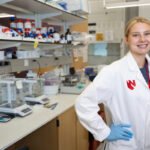The Lied Jungle and Desert Dome at Omaha’s Henry Doorly Zoo and Aquarium are open to guests beginning today, Monday, October 31, 2022. No further cases of Highly Pathogenic Avian Influenza (HPAI) have been identified on Zoo grounds after two Pink-backed pelicans died of HPAI on October 13 and 14. The Lee G. Simmons Aviary will remain closed as the Zoo moves from level 5 to level 4 of its prevention and response plan.
Veterinary staff have tested several birds from the Simmons Aviary and the Madagascar outdoor exhibit for HPAI and all results have been negative The four remaining Pink-backed pelicans tested negative for HPAI and are in good health. These pelicans have been moved to an indoor location for the winter. No other birds at Omaha’s Henry Doorly Zoo and Aquarium have shown any symptoms or required testing.
Omaha’s Henry Doorly Zoo and Aquarium has taken multiple steps to reduce the number of wild waterfowl from lingering on Zoo grounds. Two inflatable tube men have been strategically placed on the lagoon to deter wild geese and ducks from landing due to their erratic arm movements. The guest path is being washed down each morning to remove any waterfowl fecal material, and the most at-risk birds in the Dome have been moved to an off-exhibit holding area until the Zoo moves to a lower response level. There is also a “foot bath” mat at the entrance to the Lied Jungle that the Zoo is asking all guests to step in as a precaution.
The Simmons Aviary is the Zoo’s highest-risk area and will not reopen until the Zoo is able to move down to response level 2. “Our Aviary holds many susceptible waterfowl species and is open to wild birds, although only birds smaller than sparrows can actually get in,” said Dr. Sarah Woodhouse, Director of Animal Health for Omaha’s Henry Doorly Zoo and Aquarium. “The Aviary is also near the lagoon where the wild waterfowl hang out, which makes it very likely that guests could unintentionally step into fecal matter of wild birds and walk it into the Aviary.”
“Our number one priority is always to protect our birds and guard against any potential spread of Avian influenza,” said Dr. Woodhouse. “At a level 4, precautions also remain in place for staff in bird areas including foot baths, limited access, and protective clothing.”
Omaha’s Henry Doorly Zoo and Aquarium continues to work with the USDA and the Nebraska State Veterinarian, and will keep the public updated if anything changes.
Wild waterfowl carry the HPAI virus, often without becoming sick, and detections of HPAI have increased across the country over the past few weeks due to the fall migration pattern. The main way that HPAI is transmitted is from the feces of infected wild birds. This can happen as wild birds fly overhead, or by someone stepping in infected wild bird feces and carrying the infection with them on their shoes.
The Simmons Aviary was previously closed between March 3 and June 23 as a precaution against HPAI. During that time, none of the birds living at Omaha’s Henry Doorly Zoo and Aquarium or at the Wildlife Safari Park were infected by Avian influenza.











